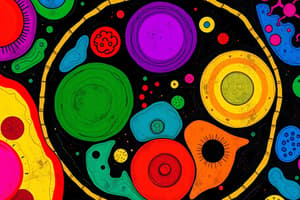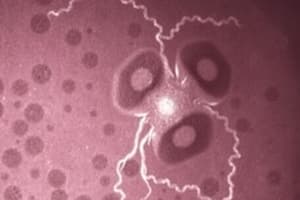Podcast
Questions and Answers
What is the central concept of cell biology?
What is the central concept of cell biology?
The cell theory
Name three organelles and their functions.
Name three organelles and their functions.
Mitochondria produce energy, endoplasmic reticulum synthesizes proteins, and chloroplasts capture sunlight.
What drives the movement of molecules across membranes?
What drives the movement of molecules across membranes?
Concentration gradients or protein pumps
What is the process of production of peptide chains from amino acids called?
What is the process of production of peptide chains from amino acids called?
How are gene transcription and translation controlled in cells?
How are gene transcription and translation controlled in cells?
How do new cells arise according to the cell theory?
How do new cells arise according to the cell theory?
What are some key experimental techniques used in cell biology today?
What are some key experimental techniques used in cell biology today?
What is the purpose of meiosis in the process of reproduction?
What is the purpose of meiosis in the process of reproduction?
Describe the process of fertilization in human reproduction.
Describe the process of fertilization in human reproduction.
What is embryogenesis in the context of reproduction?
What is embryogenesis in the context of reproduction?
How does cell biology contribute to understanding living systems?
How does cell biology contribute to understanding living systems?
What is the significance of gene editing in cell biology research?
What is the significance of gene editing in cell biology research?
Flashcards are hidden until you start studying
Study Notes
Exploring Life at the Cellular Level: An Overview of Cell Biology and Reproduction
Cell biology, the branch of life sciences concerned with the structure, function, and interactions of cells, forms the foundation of our understanding of living systems. From humble beginnings studying single cells beneath a microscope, modern cell biology now utilizes sophisticated tools to probe the inner workings of cells within specialized environments such as laboratories and natural ecosystems.
The Essentials of Cell Biology
At the heart of cell biology lies the concept of the cell theory, proposing that all living entities are made up of cells, which contain genetic information, and that new cells arise only via cell division. Central to cell biology is the comprehension of essential structures and functions:
- Organelles — specialized functional units within cells, like mitochondria producing energy, endoplasmic reticulum synthesizing proteins, and chloroplasts capturing sunlight.
- Membrane transport—the movement of molecules across membranes driven by concentration gradients or protein pumps.
- Protein synthesis—production of peptide chains from amino acids and folding of newly formed polypeptides into functional proteins.
- Genetic regulation—control of gene transcription and translation based on environmental signals and genetic blueprints.
Unlocking Cellular Secrets: Experimental Approaches
Advances in technology allow apprentice biologists to scrutinize cellular dynamics, often employing cutting edge imagery and molecular probes. Key experimental techniques used in today's cell biology endeavors include:
- Fluorescence microscopy—visualizing cellular components (e.g., DNA, lipid bilayers, specific proteins) tagged with fluorescent dyes or genetically encoded tags under illuminators that excite the fluorophores.
- Electron microscopy—high resolution images of intracellular ultrastructure obtained using transmission electron microscopes.
- Live cell imaging—continuous monitoring of dynamic cellular events utilizing time-lapse microscopic techniques.
- Gene editing—manipulation of genes using CRISPR/Cas9 technology to investigate the roles of particular genes in cellular processes.
The Art of Reproductive Success
Reproduction, the continuity of life, encompasses the creation of offspring. It relies heavily on cellular mechanisms and follows universal patterns among species. In humans, reproduction proceeds through three stages: meiosis, fertilization, and embryonic development:
- Meiosis—reduces chromosomes numbers in germ cells, resulting in gametes (sex cells) containing half the number of chromosomes characteristic of somatic cells.
- Fertilization—combination of a spermatazoon (male gamete) and ovum (female gamete) creating a diploid zygote with the full set of parent chromosomes.
- Embryogenesis—development of the fertilized egg into a multicellular organism, beginning with cleavage divisions followed by morphogenesis and differentiation of tissues and organs.
In summary, cell biology serves as the fundamental basis for understanding living systems, while reproduction provides the means for propagation of life. Advancements in technology and the availability of cutting-edge tools enable deeper insights into the secrets of life at the cellular scale.
Studying That Suits You
Use AI to generate personalized quizzes and flashcards to suit your learning preferences.




